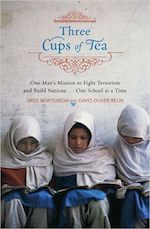
Three Cups of Tea
Thomas Friedman had an interesting column in the New York Times on Sunday, titled “Teacher, Can We Leave Now? No.” His commentary touches on many of the most difficult questions currently facing American politicians and military strategists: what is happening in Afghanistan, what is our role in the process, and when is it time to leave? Friedman is limited to the space of an op-ed and his words do take on a touch of the “look at me” tone that has previously been noted here, but in mentioning Greg Mortenson, Friedman leaves the reader with a reference to a nonfiction account of life along the border between Pakistan and Afghanistan that is well worth a look.

Much of the book follows a familiar thread: with limited resources and financial backing, a stubborn American finds a way into remote village, gradually earns the trust of skeptical villagers, and helps build a school which opens to great excitement by previously skeptical villagers. By the end of the book, the stories are less gripping than they are at the beginning simply because they sound like something the reader has heard before. The risks that Mortenson takes (and continues to take in his real life) are not minimal: at one point he is kidnapped by the Taliban and only extreme good fortune keep him out of a shallow and unmarked grave in one of the world’s most inhospitable mountain ranges Calling to mind A Mighty Heart, another outstanding memoir of one individual trying to make a difference, one could say that Greg Mortenson was lucky where Daniel Pearl was not.
It’s precisely the “can-you-believe-he-just-did-that” factor that makes Three Cups of Tea worth reading. To date, Mortenson has started over 90 schools in the rural areas along the Pakistani-Afghan border, and together these schools provide education to over 34,000 children, 24,000 of whom are girls. Amidst the volatility of international politics and the never-ending and at times hopeless situation that is reality in this part of the world, Mortenson’s life stands out. His book is required reading for senior members of the US military and units deploying to Afghanistan, and he has received the highest award for civil service that the government of Pakistan can bestow. When one considers the countless children whose lives he has touched, it is impossible to measure the impact of this individual who saw a need and decided to do something about it. More information about Mortenson and his school-building efforts can be found at threecupsoftea.com.
And in the meantime, we must come back to Friedman’s question. Teacher, can we leave now?
